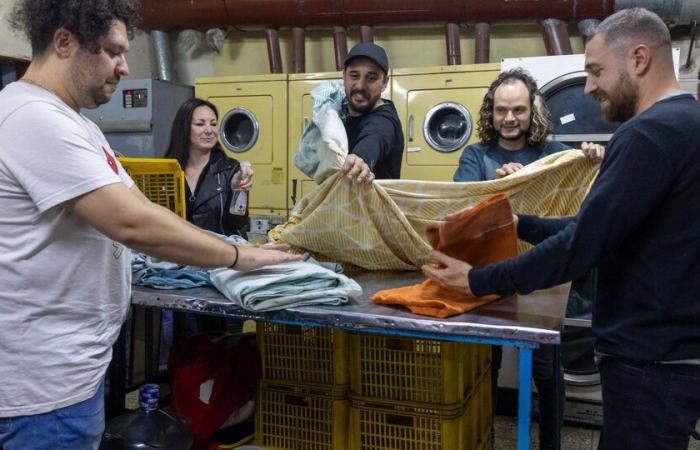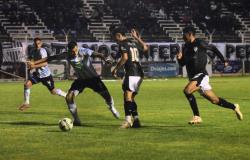
On the corner of Mario Bravo and Sarmiento, one block from Plaza Almagro, the Chirola laundry continues its activity in the heart of the neighborhood, as it did forty years. Over the bars of one of its windows hang dozens of pots with different types of plants that make up the other business unit of the premises: a nursery. What few passers-by know is that one of the cult bands of Argentine rock operates there – just ask La Renga or Las Pastillas del Abuelo, who are always recommending it -: La Condena de Caín set up its bunker, crowned with a living room. tests in the underground.
“I grew up among baskets and washing machines, but artists, painters and musicians also came to chat or have a mate, because before the neighborhood had a much more present tango aspect, especially in the Abasto era, which Luca Prodan described very well in the Sumo song dedicated to the neighborhood; so the place was also a kind of social and cultural center,” adds Matías Westerkamp, guitarist and co-founder of the group that this Saturday 6/15 will celebrate its first two decades at Uniclub (Guardia Vieja 3360), after being put together as a product of the union of two pre-existing groups, The Mark of Cain and The Condemnation of Sigfrid.
“The laundry bears the pseudonym of my old man, who was a political activist all his life and opened it with my mother after being imprisoned during the last dictatorship. He went through the prisons of Rawson, Sierra Chica, La Plata and Devoto, where he met the who would later be my uncle; and, through him, my old woman,” says Matías, Gustavo’s son, who was arrested in October 1975 after appearing for a medical examination to complete his mandatory military service. Chirola studied Economics and belonged to the PRT-ERP in times when not only Triple A was intensifying, but also when the so-called “Annihilation Decrees” were already operating.
This entire narrative arc between work, art and militancy influenced the development of La Condena de Caín from its first minute: “Sawa Mielnik, the singer, came from his native Puerto Madryn to Buenos Aires in 2004 and not only He joined the band, but also the store, because he needed to work. Then my old man taught him how to fix machines for other laundries. They generated a very nice emotional bond, also from an emotional and ideological point of view. I had some in Madryn.”
The Condemnation of Cain is completed with the other founder, bassist Marcelo Di Giovanni, plus keyboardist Damaris Pozner and drummer Mauro Cognini, both additions during a pandemic, times that put the band to the test. Although it was not the first time: their debut show was two weeks before Cromañón and the tragedy forced them to reconfigure their roadmap in a devastated rock scene. True survivors of disasters. “To live you have to survive, and that is what we feel we do, always seeking that this becomes a creative pulse,” confirms Matías. “I believe that the ability of the artist is to make that alchemy and be able to turn pain into adventure, and lack into power. It has been a characteristic of ours over the years and what allows us to continue together thinking about songs, albums and shows or “Any other crazy thing we can think of.”
On the other side of the cataclysms, the current La Condena combo maintains a repertoire spread across five albums and the recent EP High seaswhich includes a ballad (the one that gives its name to the release), a rock with epic choruses (Resist) and an ode to melodies (The adventure of things). This profuse artistic inventory synthesizes the main talents of a band that swings between good poetry, valuable compositions and hymns to clench its fists at the sky.
And just as the Chirola laundry is the operational epicenter, La Codena de Caín considers Uniclub as its “second home”, a true example of neighborhood loyalty for a group that has set foot on all imaginable Buenos Aires stages, including the most exalted ones such as Obras, the Malvinas Argentinas, The Flores Theater or La Trastienda. “To begin with, the Uni is in El Abasto, a few blocks from where we have the room. A place with a lot of history: before it was Babilonia and Los Piojos posterized it in that song that also names Guardia Vieja street. We grew up there, so it’s beautiful to be able to celebrate our 20 years on that stage,” says Matías.
In addition to this celebration with “a lot of friends, guests and traveling companions,” according to the guitarist, the band will present one of the songs they already recorded in the Cerati family’s Unísono studio under the production of Juan Pablo Alfieri (drummer from Todo Apparenta Normal) and that they will be part of an imminent new album.
- In High seas They sing that “there is always freedom in madness.” The song was composed two years ago, but today the words “freedom” are trying to be reappropriated by the right. How do you see that?
- Disputes begin with language: one begins by giving in to words and ends up giving in to actions, Freud said. We discuss the words and the concepts that arise from them, obviously. And the word “freedom”, which has now been appropriated by those who are passing through, has a lot of history and a lot of bodies that put their lives for it. We dispute it from poetics. The word “madness” too, because we live in an ultra-calculated, rationalized society, where everything has to do only with efficiency and profit. But, for us, madness is a bit of a way out of that, especially when it stimulates creativity. Despite the fact that the puppet we have as president has also appropriated it.
- La Condena is a sociable and lovable band, and you often point out that they feel part of Argentine popular music, also understood as a collective phenomenon.
- We feel part of a family tree that is Argentine popular music, because rock belongs to it. Especially the one who raised us: Los Redondos, Los Piojos or La Renga, who are a kind of teachers and older brothers, offered us in our adolescence a vision that opposed the “every man for himself” of neoliberalism of the ’90s. . And in a time like the current one, in which there is an entire dominant discourse where the important thing is not only to save oneself, but to step on the head of those who are below, for us music is a collective phenomenon. We admired a lot, we learned and we felt like companions on the road from El Bordo, Nagual, Cielo Razzo, Eruca Sativa or Marilina Bertoldi, among others. When you compose a song, you are never alone, because in your head there are all these artists who are talking to you and telling you something. That is what we consider part of a tradition: in Argentine song there is a vehicle of emotions that seems to me to be somewhat unmatched, and in that sense we pay tribute to the melody, which is what moves us and transmits things to us.
https://www.instagram.com/p/C8F33uJuCeB
- Against more NO notes hereor subscribe below ↓ to receive all the articles, the show schedule, new music and our recommended ones for free in your email.





